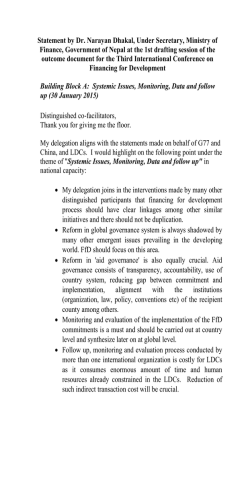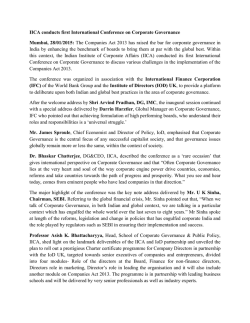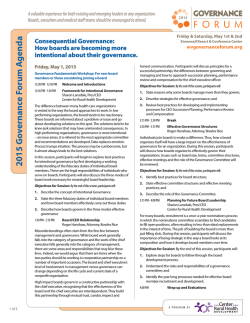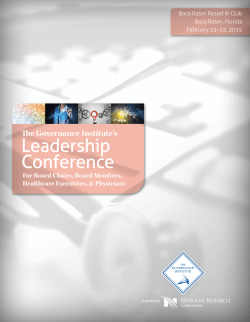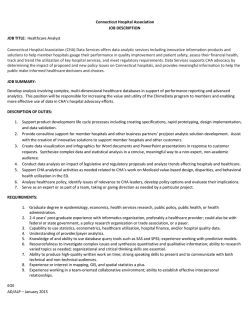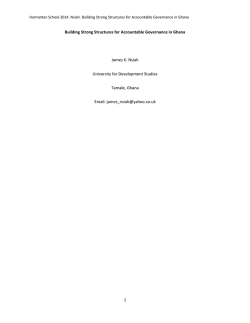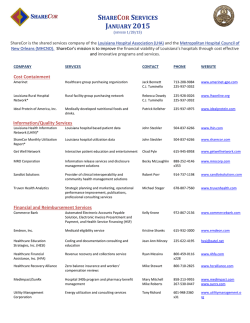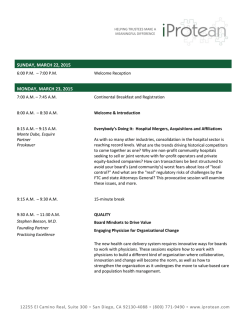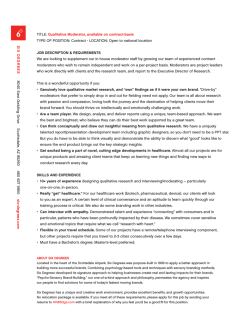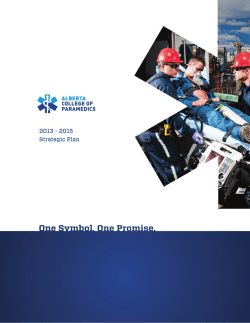
Download the Brochure (PDF) - the Center for Healthcare Governance
National Symposium on Leading and Governing Healthcare Organizations February 22-25, 2015 | Arizona Biltmore, Phoenix, AZ Agents of Change: Governing and Leading Transformation Register by December 12th for the greatest savings with Early Bird tuition. Plan a Retreat for Your Board during the Symposium The Symposium offers an excellent opportunity for your board to meet in a retreat setting with select Symposium faculty. Opportunities are limited— call now to learn more. Optional Pre-Symposium Workshop Sunday, February 22nd The Leadership Toolkit for Redefining the “H”: Engaging Trustees and Communities For more information, please contact the Center at (888) 540-6111 or visit the Center’s Web site at www.americangovernance.com. Who Should Attend The Symposium is designed for governing boards, CEOs and senior executives, physicians and other clinicians with leadership and governance responsibilities, staff members who coordinate and support governing board activities, and executives in health care related industries. Learning Objectives Participants will: • Expand their awareness of the changing context of health care and efforts to transform the delivery system through analyses of emerging trends in physician/ hospital affiliations, population health management, patient engagement, and new payment and performance measurement models. • Understand how heightened demands for improved quality, new partnerships, and enhanced efficiency and effectiveness are changing the board’s role and oversight responsibilities. • Gain insights into the innovative governance practices and critical leadership competencies that will move the board from good governance to excellent governance. Plan a Retreat for Your Leadership Team The Symposium offers an excellent opportunity for your board to meet in a customized retreat setting with select Symposium faculty. Debrief on what you’ve learned during the program and explore how it applies to your organization, or address a specific board issue that you’re facing. Contact us at (888) 540-6111 for more information and to schedule your event. Retreat opportunities are limited, so please act quickly. 2 The Center for Healthcare Governance presents its winter Symposium on leading and governing health care organizations. In this three-day program, trustees and executive leadership will gain insights into the trends that are transforming the delivery system and learn strategies and tools for navigating an increasingly complex environment. In plenary sessions, industry experts will offer analyses of the contextual issues framing the health care environment—from the strategic questions central to transformation of the delivery system and managing the health of a population, to the efforts of leaders to provide safe, equitable patientcentered care, and critical imperatives for payment system reform and clinical integration. In small group interactive sessions, we’ll focus on innovative approaches for honing governance decision making and engagement, and explore emerging responsibilities for boards to oversee physician compensation and leverage affiliations for improved performance. Consider arriving early to enjoy all that Phoenix has to offer and register for the pre-conference workshop on Sunday, February 22nd. In this new session, participants will learn how to redefine the hospital of the future through strong governance structures and practices, and community engagement. You’ll get more out of your Symposium experience with the in-depth education that the workshop offers. Separate pre-registration is required. Ample time will be provided for sharing, asking questions and seeking guidance from our top governance experts and your peers. By attending the Symposium, the leaders of your organization will acquire the new knowledge and skills to manage the complexities of health care transformation. You will learn to ask the tough questions, gain valuable insights on how to get the most from your leadership teams, and build new levels of commitment. Sunday, February 22nd 9:45 – 11:00 am GENERAL SESSION How Trends Shape Organizations 12:00 – 5:00 pm David Nygren, PhD, Founder, Nygren Consulting, LLC, Santa Barbara, CA Registration Open 2:00 – 4:00 pm OPTIONAL PRE-SYMPOSIUM WORKSHOP (Separate registration required) The Leadership Toolkit for Redefining the “H”: Engaging Trustees and Communities The blue and white hospital “H” carries the promise of help, hope and healing. While the hospital of the future will continue to extend that promise, it may do so in significantly new ways. Indeed, hospitals today are intently focused on redefining the “H,” exploring what it means to be a hospital in a rapidly transforming health care world. As hospitals consider redefining themselves, it will be crucial that they have educated and engaged leaders at the governance level who can help the health care organization navigate new payment models, delivery system reforms and new community health challenges. It is equally important that these significant changes are planned for, not only within the hospital, but with strong input and engagement from the local community. This practical session will focus on the AHA’s January 2015 leadership toolkit report on how to redefine the hospital of the future through strong governance structures and practices, and community engagement. Monday, February 23rd 7:00 am – 4:00 pm Registration Open 7:00 – 8:00 am Continental Breakfast 8:00 – 8:15 am Opening Remarks John R. Combes, MD, President and COO, Center for Healthcare Governance and SVP, American Hospital Association, Chicago, IL 8:15 – 9:30 am GENERAL SESSION Governance, Leadership and Creative Destruction James E. Orlikoff, President, Orlikoff & Associates, Inc., and Senior Consultant, Center for Healthcare Governance, Chicago, IL Hospitals and health systems are the most complex businesses in human history—and that was before we faced imperatives for population health, clinical integration, and doing better with less. Disruptive innovation typically is driven by forces external to an organization but we are being asked to disrupt our own business model; to simultaneously destroy it while we create and implement another model. This is a daunting task and we cannot do it and lead our organizations successfully into the future with the same models and mentalities of governance that we use to govern our local churches and Boy Scout organizations. This presentation will outline the forces gathering to destroy our traditional business models and describe how governance and leadership must become agents of disruptive innovation in their own organizations—becoming the grain of sand that irritates the oyster causing it to produce a pearl. 9:30 – 9:45 am Refreshment Break The velocity of change to our care delivery systems, payment reforms, and physician engagement requires re-conceptualizing what we are governing and who is governing. This session will explore how we govern beyond the acute hospital as we enter broad networks. We will see the shift of information, metrics, board competencies and outcomes as we begin to govern population health. 11:00 – 11:15 am Refreshment Break 11:15 am – 12:30 pm GENERAL SESSION Physician Governance in Quality, Safety and Supply Chain D. Keith Fernandez, MD, FACG, President and Physician in Chief, MHMD and Chief Medical Officer, Memorial Hermann ACO, Houston, TX The Memorial Hermann Health System and the Memorial Hermann Physician Network (with 2000 physician members, only 150 who are employed) provide governance of quality and safety in the health system using the Clinical Programs Committee and its 25 specialty and subspecialty groups and 15 task oriented subcommittees, made up of over 400 of the IPA network physicians. Learn how the direct relationship between this Committee and the Board of Memorial Hermann system has led to remarkable uniformity in quality and safety in each of the system’s nine acute care hospitals. 12:30 – 1:30 pm Lunch ...gain insights into the trends that are transforming the delivery system... 3 1:30 – 2:45 pm STRATEGY SESSIONS A New Model for Transforming and Engaging Board Meetings 1 Luanne Stout, MHA, VP/ Chief Governance Officer, Texas Health Resources, Arlington, TX As health systems and hospitals face new models of health care delivery, population health, and coordinating care along the continuum, most current board meeting structures will not serve us well in the future. This very practical session presents a new model that will transform board meetings into engaging, highly effective events focused on prospective discussions on topics that advance the organization, rather than the retrospectively focused model most boards utilize today. How Does Your Board Stack Up? The State of Governance with Insights from the 2014 National Governance Survey 2 John R. Combes, MD, President and COO, Center for Healthcare Governance and SVP, American Hospital Association, Chicago, IL and Debra Stock, Vice President, American Hospital Association, Chicago, IL In the fall of 2014, the AHA’s Center for Healthcare Governance will release the results of the 2014 National Governance Survey, the most comprehensive, state-of-the-art picture of hospital and health system governance in the United States. The survey, which was sent to all community hospital CEOs and Board Chairs, represents over 1,800 respondents. Participate in this session to learn how your board and governance practices compare to those of your peers in such critical areas as board member selection, assessment, competencies, and culture, and discuss the implications of the data for board performance in the evolving health care environment. Bring your toughest governance issues for discussion and deliberation. This session will be very interactive, so come prepared to talk, to question assumptions and offer your own thoughts. 4 From Volume to Value: Toward the Second Curve by Way of a Network Affiliation that Preserves Independence 3 Todd Linden, President & CEO, Grinnell Regional Medical Center, Grinnell, IA As the transformation of the nation’s health system begins to take shape, the focus on greater accountability for patient outcomes, patient experience, cost of care, and population health may present a particular challenge for independent hospitals. Learn how Grinnell Regional Medical Center working through its affiliation with Mercy Health Network and the University of Iowa Health Alliance established a Clinically Integrated Network for moving to population health. With the CIN focused on the care locally and in a structure that will allow connection into the larger statewide system, the strategy is to ease into value-based care over the next 12-24 months. With a manageable number of clinical professionals in a smaller market area, GRMC can work directly with its providers to determine what they need to improve outcomes and make more effective decisions about the care being provided to at-risk patients. Physician Compensation Oversight: How Boards Create Effective Governance Systems to Improve Alignment and Reduce Risks 4 Marc Hallee, Consulting Principal, Sullivan, Cotter and Associates, Inc., Houston, TX and Erin Flanigan, Vice President of Human Resources, Wentworth-Douglass Hospital, Dover, NH Hospital and health system board members understand the complexities associated with governing physician compensation arrangements and alignment strategies. When new entities are formed or acquired, the need to have a process that clearly defines the roles and responsibilities of the governing bodies increases, as do the risk of oversight issues and compliance failures. This session will address regulatory and compliance challenges associated with the governance of physician compensation. Participants will learn how to formulate their organization’s approach and examine case studies that demonstrate how leading organizations address physician compensation requirements and challenges. The presenters will also share actionable steps board members can use to outline oversight strategies that manage risk at various levels in the process and build relationships needed to achieve goals. 2:45 – 3:00 pm Refreshment Break 3:00 – 4:15 pm STRATEGY SESSIONS REPEATED 5:00 – 6:30 pm Networking Reception Support for the reception is generously provided by Tuesday, February 24th 6:45 – 8:00 am Continental Breakfast 7:00 – 8:00 am Special Breakfast Session for Center for Healthcare Governance Member CEOs/Chairs 8:00 – 8:15 am Opening Remarks John R. Combes, MD, President and COO, Center for Healthcare Governance and SVP, American Hospital Association, Chicago, IL 8:15 – 9:30 am GENERAL SESSION 2015: The View from Washington, D.C. Rick Pollack, Executive Vice President for Advocacy and Public Policy, American Hospital Association, Washington, DC Mr. Pollack will provide an update on the latest federal activity and the potential effect on America’s hospitals and health systems. He will discuss the latest events as Congress and the Administration contend with deficit reduction, the debt ceiling, ACA implementation and other critical health care issues. 9:30 – 9:45 am Refreshment Break 9:45 – 11:00 am STRATEGY SESSIONS Creative Affiliations for Success in the New Era: Disruption Is the New Normal 1 Patrick Allen, Senior Vice President, Kaufman, Hall & Associates, Inc., Skokie, IL and John Poziemski, Vice President, Kaufman, Hall & Associates, Inc., El Segundo, CA Rapid changes under way for the nation’s health care system are driving many hospitals and health systems to actively explore partnership discussions with providers, payers and/or other key stakeholders. These arrangements are disrupting, and in some instances converging traditional boundaries in markets nationwide. This session will provide insights into how organizations are using partnerships, acquisitions, and other affiliations to strengthen their market position in preparation for value-based care delivery and payment. The presenters will offer practical strategies to help hospitals and health systems assess their current strengths and weaknesses within their market, and determine whether a partnership with a payer or other stakeholder, including employers might be beneficial. You will gain a foundational understanding of the different types of affiliations that are emerging, and insights into the key questions to ask in evaluating potential partners and partnership types. ...learn strategies and tools for navigating an increasingly complex environment. 2 Your Obligation to Eliminating Patient Harm Maulik S. Joshi, DrPH, President, HRET / SVP, American Hospital Association, Chicago, IL and Todd Linden, President & CEO, Grinnell Regional Medical Center, Grinnell, IA Fiduciary role number one for all trustees is ensuring that your patients receive the highest quality and safest care. Although there are many ways to measure quality and safety, a bottom line patient safety number is elusive in health care. However, by looking at a total patient harm rate in your health system, you can begin to focus on an overall safety outcome and strategies. In this session, the presenters will strategically and practically help you develop and use a total patient harm rate for your hospital. Attendees will learn how to use a patient harm rate measure in the boardroom and the strategic discussion the trustees must have to strive to get the patient harm rate to zero. Futurescan: Healthcare Trends and Implications for 2015–2020 3 Deborah Bowen, FACHE, President, American College of Healthcare Executives, Chicago, IL This annual review of selected health care trends will help you plan for the future. Developed by a panel of experts, Futurescan highlights key trend areas that are impacting the nation’s health care organizations: health care reform, transparency, provider structure, volume to value, innovations in primary care, private insurance exchanges, advance care plans, and innovations in iMED. Surviving and Thriving in the New Commercial Environment 4 Sam Glick, Principal, Health and Life Sciences, Oliver Wyman, San Francisco, CA By 2018, one in three patients who walk through a hospital’s doors will be covered under a different insurance product than they are today, which they will have purchased through a channel that didn’t exist three years ago. These patients will have higher deductibles, higher copays, more cost and quality information, and higher expectations for the experience that their health system provides than ever before. They will also have more options than ever for where to receive care, from retailers to mobile apps to medical tourism providers around the globe. Attracting commercial patients is key to the long-term viability of any health system—and the changes happening in the commercial market require whole new ways of engaging with customers. This session will help you understand the new expectations of payers, employers, and consumers, and what your health system can do to survive and thrive in the new commercial environment. 11:00 – 11:15 am Refreshment Break 11:15 am – 12:30 pm STRATEGY SESSIONS REPEATED 12:45 – 2:00 pm Lunch with Interactive Governance Clinic Grab lunch and join an open discussion around best practices in health care governance. Jamie Orlikoff will offer participants practical solutions and proactive ideas for solving your governance problems. This session will be very interactive, so come prepared to talk, and to challenge and be challenged! 2:00 – 3:15 pm GENERAL SESSION Evidence-Based Health Care Leadership David H. Newman, MD, Director of Clinical Research, Department of Emergency Medicine, Mt. Sinai School of Medicine, New York, NY Dr. Newman has become a leading voice calling for reforms in health care—in the ways we deliver care and in the ‘system’ through which care is delivered. He offers bold ideas on how to restore access, quality and efficiency as sovereign forces. He questions ‘holding down costs’ as the primary objective in reform and urges a much deeper respect for good science in a field that claims to be based in science. In this session Dr. Newman will address 5 The Center for Healthcare Governance recognizes its affiliate members and thanks them for their continued support. how health systems can partner with communities by building trust and applying evidence. It is a message about the partnership between science and society, patient and doctor, health system and community. When these intertwined relationships are built on trust and honesty, satisfaction goes up, utilization goes down, and efficiency improves. Outcomes get better while costs are reduced—everyone wins. Wednesday, February 25th 7:00 – 8:00 am Continental Breakfast 8:00 – 9:15 am GENERAL SESSION Coming Together as One: The Baylor Scott & White Story Joel Allison, CEO, Baylor Scott & White Health, Dallas, TX This session will explore the story of two organizations coming together to create an integrated delivery network focused on population health management. Mr. Allison will describe the development of a clinically integrated model for transforming how health care is delivered. 9:15 – 9:30 am Break 9:30 – 11:00 am GENERAL SESSION Having Enough Dots to Connect: Broadening Health Care’s Perspective and Potential Laura Adams, RN, President & CEO, Rhode Island Quality Institute, Providence, RI Few would dispute that the U.S. health care system is not performing up to its potential. The problems are highly complex and no one entity acting alone can solve them. As we transition to new payment models, the greatest opportunity to deliver on the promise may lie not in “engaging patients” with us, but engaging in the lives of our patients. This presentation will address the need to create a health care system guided by a new definition of health, new ways to tell the truth about our performance, and the recognition that the patient/ consumer is already in control of their health. When these principles guide design, we can create a health care system worthy of the trust of those who depend on it literally for their lives. 11:00 am Adjourn About the American Hospital Association’s Center for Healthcare Governance The Center for Healthcare Governance is a community of board members, executives and thought leaders dedicated to advancing excellence, innovation and accountability in health care governance. The Center offers new and seasoned board members, executive staff and clinical leaders a host of resources designed to progressively build knowledge, skills and competencies tailored to specific leadership roles, environments and needs. 6 Schedule a GAP (Governance Assessment Process) Now The Governance Assessment Process is a comprehensive system used to assess the overall performance of health care organization boards. Through a variety of detailed surveys, GAP will reveal an organization’s strengths and weaknesses, and help a board to thoroughly assess how well it is meeting its obligations and fulfilling its responsibilities. GAP also evaluates the quality of the board’s structure, composition and infrastructure. Once completed your board will be able to develop a targeted action plan for improving its performance and establish a baseline for tracking changes in performance over time. Designed for boards that are serious about continuous improvement, GAP is a Center member benefit that is also available to non-members as a standalone service. Contact us at (888) 540-6111 to schedule your GAP. National Symposium on Leading and Governing Healthcare Organizations February 22-25, 2015 Arizona Biltmore, Phoenix, AZ How to Register Onlinewww.americangovernance.com/registration Mail For Information Center for Healthcare Governance 75 Remittance Drive, Suite 1976 Chicago, IL 60675-1976 (312) 422-3276 Tracey Johnson-Wilson [email protected] Name_________________________________________ Credentials (MD, DO, etc.)______________________ Nickname to appear on badge_____________________________________________________________ Title_____________________________________________________________________________________ Organization Name_______________________________________________________________________ Address_________________________________________________________________________________ City, State, Zip___________________________________________________________________________ Phone_________________________________________ Fax_______________________________________ Attendee’s Email__________________________________________________________________________ Please select the appropriate Registration Type: Early Bird Rate Regular Rate by December 12th after December 12th Center for Healthcare Governance Member Rate: Contact us at [email protected] if you are unsure as to whether your organization is a member of the Center. Please note that Center membership is separate from membership in the American Hospital Association. CHG Educational Credits: Select this type if you would like to apply Center member educational credits to attend the symposium. If you are unsure as to the availability of your credits, email [email protected]. $1,200 $1,300 Enter your Center for Healthcare Governance Membership Number to qualify for this rate: Complimentary Complimentary Enter your Center for Healthcare Governance Membership Number to qualify for this rate: Non-Member Rate: For organizations that are not a member of the Center for Healthcare Governance. $1,500 $1,600 Board Planner Complimentary Rate: For organizations sending 5 or more paid attendees, the tuition fee is waived for one staff member who is responsible for coordinating governance activities. CEOs and trustees are not eligible for this offer. All registrations must be submitted at the same time. Complimentary Complimentary Pre-Symposium Workshop Option, February 22nd The Leadership Toolkit for Redefining the “H”: Engaging Trustees and Communities $200 $250 Total Symposium Fees Payment Methods (registration form must accompany payment) Check or Money Order: Payable to Center for Healthcare Governance, please mail check or money order with this form to the address above. Credit Card: To pay with a credit card, please submit the registration online at www.americangovernance.com/registration. Center Member Educational Credits: Please visit online registration at www.americangovernance.com/registration. Arizona Biltmore Known throughout the world as the “Jewel of the Desert,” the Arizona Biltmore provides a restful oasis of 39 acres covered with lush gardens, glistening swimming pools, and Frank Lloyd Wright-influenced architecture. Considered one of the most spectacular resorts in the world, the Biltmore features eight swimming pools, seven tennis courts, an 18-hole putting course, and a full-service European spa, salon, and fitness center. The adjacent Arizona Biltmore Country Club offers two 18-hole PGA golf courses, The Links and The Adobe. Arizona Biltmore 2400 East Missouri Avenue Phoenix, AZ 85016 Reservations: (800) 950-0086 Main Hotel, Guests: (602) 955-6600 www.arizonabiltmore.com To secure the special room rate of $279 plus tax, single or double occupancy plus a $14 per day resort fee (to cover high-speed Internet access, unlimited local calls, long distance access, spa and fitness center admittance, Fashion Park shuttle, morning newspaper, and use of the putting course), reserve your room by February 1, 2015. When calling please reference either the group code “CHG15” or “Center for Healthcare Governance.” You may also reserve rooms via the resort’s website. Simply enter the code CHG15 under the Group Code section of the reservations screen. We strongly encourage you to call early to reserve your room, as the hotel is likely to sell out well before the cut-off date. Once the block is sold out, space and rate availability are at the hotel’s discretion. Travel Discounts Airline Discounts: Special discounts are available for Symposium attendees on United and Delta airlines. • United Airlines: Call (800) 426-1122 or www.united.com Online reservations offer code: ZTDP367575 Phone reservations meeting codes: Z Code ZTDP & Agreement Code: 367575 • Delta Airlines: (800) 328-1111 or www.delta.com (click on Advanced Search to enter the Meeting code). Meeting code: NMK5Z Rental Car: Special rates from Hertz are available. Call (800) 654-2240 and provide the meeting number CV#03AB0011. Continuing Education Credit The Center for Healthcare Governance is authorized to award 15.75 hours of pre-approved ACHE Qualified Education credit (non-ACHE) for this program toward advancement or recertification in the American College of Healthcare Executives. Participants in this program wishing to have the continuing education hours applied toward ACHE Qualified Education credit should indicate their attendance when submitting application to the American College of Healthcare Executives for advancement or recertification. Scholarships Partial tuition scholarships are available. Please email Laura Woodburn at [email protected] for more information on how to apply. The scholarship deadline is January 1st. Symposium Cancellation The cancellation deadline for this conference is January 30, 2015. If you cannot attend the conference, you can always send a substitute, even at the last minute. (Please notify us of any changes in advance so that we can have a badge prepared.) If you must cancel entirely, your request for a refund (less a $250 processing fee) must be received in writing no later than January 30, 2015. Cancellations made after that date are not eligible for a refund. Special Accommodations The Center for Healthcare Governance complies with the Americans with Disabilities Act and strives to ensure that no individual with a disability is deprived of the opportunity to participate in an educational program solely by reason of that disability. The Center will attempt to provide a reasonable accommodation for an attendee with disability who requests accommodation. Please contact [email protected] at least 21 days in advance of the program to specify your accommodation. Presorted Standard U.S. Postage PAID Permit No. 100 Oak Brook, IL The Center provides an excellent forum for connecting with and sharing in the best practices for hospital trustees. Jim Wilkins, Vice Chair, St. Joseph Hospital National Symposium on Leading and Governing Healthcare Organizations February 22-25, 2015 | Arizona Biltmore, Phoenix, AZ Agents of Change: Governing and Leading Transformation
© Copyright 2026
